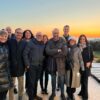Leaders are just now starting to embrace the pivotal role wellbeing can play in helping people navigate life and work more wisely. When we prioritize individual and collective wellbeing, we are naturally developing people to solve problems with purpose-driven, creative, both/and thinking, plus use their personal, interpersonal, and existential challenges to grow new degrees of discernment and resourcefulness. Well before we are pushed beyond our limits, it is an act of wisdom to prioritize and amplify wellbeing.
Leading Wisely Builds on our Innate Capacity to Thrive
![]() From Aristotle’s perspective, a fruitful and thriving life (what the Greeks called eudaimonia) is marked by making wisdom practical. This involves developing psychological maturity as a leader and turning that maturity into the mindsets and behaviors that extend beyond the welfare of your organization to the communities it touches and the larger natural and social world.
From Aristotle’s perspective, a fruitful and thriving life (what the Greeks called eudaimonia) is marked by making wisdom practical. This involves developing psychological maturity as a leader and turning that maturity into the mindsets and behaviors that extend beyond the welfare of your organization to the communities it touches and the larger natural and social world.
That’s why wisdom is part of our science-based assessment and framework of thriving, Be Well Lead Well Pulse®. As one of the six essential shifts for effective wellbeing leadership, the WISDOM dimension is about tapping into a worthwhile purpose, higher vision, and innate genius for guiding yourself and others toward inspired impact. It is measured using three psychometric scales:
- Vision & Purpose: The extent to which you have a meaningful purpose and holistic personal vision to direct your life and leadership.
- Wholeness: The extent to which you experience a sense of personal integration and internal sufficiency, even during conflicting or competing facets of life and work.
- Emotional Capacity: The extent to which you bring equanimity and lightness to your responsibilities.
We are responsible for the wellbeing of people, including ourselves, and the future of humanity and planet Earth—a responsibility we can carry together, not alone. On the path of wellbeing leadership, WISDOM is not only indispensable; it is an area of immense potential and growth.
WISDOM Practices You Can Use Now
Think of WISDOM as a navigational lens for creating meaningful impact and meeting situations in life and work with resourcefulness, growth, and the long game in mind. How do you put it into action?
Start with a few of these practices:
1. Let go of the limiting beliefs getting in your way.
Easier said than done! Limiting beliefs are stories we tell ourselves about ourselves and others that hold us back from pursuing that which enables us to lead wisely and thrive. Surface the limiting beliefs driving you. For assistance, fill in the blank for the statement that feels true for you—or add your own limiting belief to this list:
- I am not worthy of ____________.
- I am not ___________ enough to lead.
- If I take risks in how I ___________, I’m sure to fail.
- It’s too late for me to make a positive change in the way I _____________.
- If I’m not in control of __________ (everything!), it’ll all fall apart.
- (Add your limiting belief here.)
What beliefs are you no longer willing to accept about yourself or others? Get inspired to let that delusion go by listening to the beautiful poem Lost by renowned poet David Whyte. It is a potent reminder: As leaders and whole people, we are dying to feel joyful, fulfilled, and truly alive, yet we often limit ourselves.
2. Allow this belief to uplift your leadership.
When you coach, mentor, parent, or do any endeavor with others, act from this powerful belief: Human beings aren’t problems to be fixed. Everyone (no exceptions) holds vast potential for growth, effectiveness, ingenuity, and wellbeing. How does this assumption transform how you live and lead? It can be humbling and freeing to realize that every person has a depth of experiences, potential, and wisdom you know nothing about.
3. Shift to openness.
Imagine: Your meeting with a colleague is spiraling downward. Your stomach, jaw, and thinking have contracted—you’re bracing, mind and body, to defend your views. You’re caught in a dynamic which is true for us all: As our reactivity rises, our wellbeing and wisdom erode. Move your body, do a non-sleep deep rest practice, go wide with your gaze, or take a conscious breath before responding. The simple shift toward greater openness and wonder will go far in helping foster a psychologically safe work environment for everyone, including you.
4. Ask something greater of your organization.
Wisdom is about how we act every day to create a brighter tomorrow. Read the excellent book, Longpath: Becoming the Great Ancestors Our Future Needs, or listen to author Ari Wallach discuss the book’s ideas. Then, explore these questions in your organization:
- What results are we inspired to create? What higher purpose will these results serve?
- What limits to growth, such as ethics and values, will we put into place to achieve our results responsibly? How we will use these limits to growth to guide our technological, social, and workplace innovations and decisions?
- In what ways will we use our organization’s activities to help resolve the thorniest problems in people’s lives?
- What are we building today to benefit generations of tomorrow? What are the long-term, next generation implications of how we’re operating today?
- How will we enhance our capacity to thrive through our work together—and bring greater flow into the work itself?
- How will we make thriving a new standard of our organization’s success?





